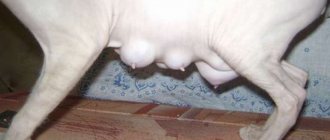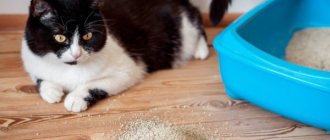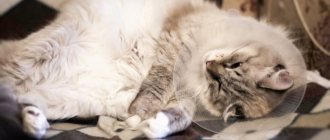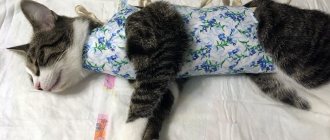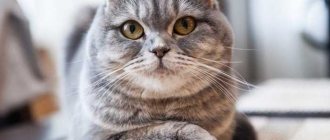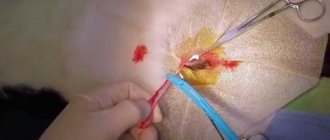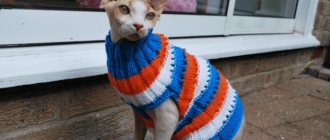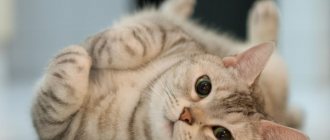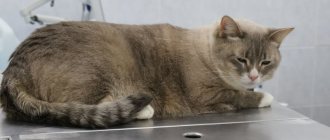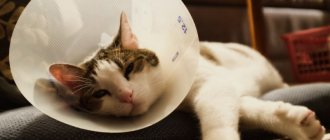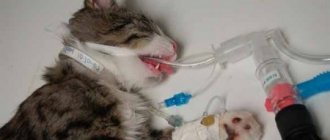WHEN SHOULD YOU CONTACT THE VETERINARIAN?
If the following signs appear, you should urgently seek the help of a specialist:
- continuous diarrhea (lasting more than 24 hours);
- too watery and liquid stool;
- constant meowing and moaning, indicating abdominal pain;
- impurities of blood and mucus in the stool;
- severe weakness and indifference to everything that happens;
- rise in temperature;
- the appearance of convulsions and seizures;
- pale gums and nose;
- incessant vomiting;
- a constant feeling of thirst that cannot be quenched;
- pronounced unpleasant odor of feces.
Causes
Diarrhea itself is not a disease, but a symptom of functional and organic diseases. The appearance of watery fecal matter indicates a secretory or motor disorder of the digestive tract. Develops in infectious and somatic diseases:
- dyspepsia,
- gastroenteritis,
- enteritis,
- salmonellosis,
- colibacillosis,
- plague,
- calicivirus,
- panleukopenia,
- helminthic infestations.
If all vaccinations are available and anti-parasitic treatments are carried out on time, most likely the cat’s diarrhea will be a consequence of an error in the diet. It is known that intestinal dysfunction is caused by:
- a sharp change in the type of food from one to another,
- giving poor quality or expired products,
- using raw or poor quality water,
- violation of feeding regime,
- even overfeeding can cause loose stools.
Also, diarrhea may indicate poisoning, which occurs both due to the fault of poor quality feed, and as a result of ingestion of household chemicals or poisons of organic and inorganic origin. Diarrhea can also be a secondary sign of a febrile state or a septic process in the body. Causes of diarrhea in cats are also:
- impaired metabolism, when excess intermediate products accumulate in the body,
- autointoxication with the same uremia as a result of renal failure,
- diseases of endocrine origin,
- allergic reactions.
A separate topic is diarrhea in a kitten, especially if it occurs in suckling babies, that is, those who are breastfed by their mother's cat.
- The first reason lies in the notorious poor-quality feeding of the female: if a nursing cat has diarrhea, then the young will also have it.
- In second place is mastitis, when pathogenic microorganisms and toxins enter the newborn’s intestines with milk, causing inflammation.
- The third point: with insufficient lighting in the first days of life, the body’s resistance to unfavorable factors decreases, which in turn leads to the development of dysbiosis with a predominance of toxic bacteria in the intestinal microflora.
Diarrhea in kittens
Other reasons
Often owners have a question about why diarrhea appears after castration of a cat or sterilization of a cat. In fact, there is no direct relationship between surgery and indigestion.
- A weakened body may thus react to fatty foods or heavy feeding when the pet needs fasting days.
- The second scenario: during surgery or immediately after it, the animal contracted an intestinal virus, being unvaccinated against infections.
- Thirdly, the operation could provoke an exacerbation of chronic processes in the stomach and intestines that occur in the anamnesis.
- And fourthly, due to individual characteristics, the body reacts in a similar way to anesthesia and medications used before and after surgery.
Why is this happening?
There can be a lot of reasons. But, frankly speaking, intestinal problems after surgery are a more than common situation. Firstly, general anesthesia can lead to “inappropriate” reactions of the autonomic nervous system, which include increased intestinal motility. If your pet passes away several times during the postoperative period, then there is most likely nothing wrong with it.
The main thing is not to let your cat eat heavily at this time: regular food will not be digested, which can lead to serious consequences. It will simply begin to rot, which can provoke not only “banal” poisoning, but also severe inflammatory bowel diseases.
WHY DOES DIARRHEA OCCUR AFTER STERILIZATION?
After sterilization (castration) in cats, like any living beings, the body's defense system decreases. It is during this period that the risk of contracting infectious diseases is very high. Some diseases cause vomiting, stool upset and fever:
- Viral peritonitis develops as a result of coronavirus entering the body of an animal through airborne droplets, fecal-oral and transplacental routes. There are two forms of the disease: dry and exudative (with effusion and accumulation of fluid in the peritoneal cavity). In the dry form, the following signs are noted: anorexia, indifference to everything that is happening, weight loss, cloudiness of the vitreous body of the eyes, the appearance of jaundice, enlargement of the lymph nodes and liver, and neurological disorders (urinary incontinence, convulsions and others) may be observed. With the exudative form, the following appears: increased temperature, increased volume of the abdomen, liver and lymph nodes, loss of appetite, loss of body weight, vomiting and diarrhea at the initial stage, development stops in kittens. There is no specially developed treatment method. The doctor prescribes glucocorticosteroids, antibiotics, and immunostimulating drugs. It is also necessary to perform a puncture of the abdominal cavity to remove accumulated exudate.
- Panleukopenia (feline distemper, feline typhus, infectious gastroenteritis) is an acute viral disease that is caused by the panleukopenia virus. Infection occurs through airborne droplets, alimentary routes, and also through direct contact with contaminated objects (bedding, dishes). The main symptoms of the disease are: loss of appetite, high body temperature, diarrhea or constipation, frequent green vomiting mixed with mucus, ulcers along the edge of the tongue, and purulent discharge from the eyes (conjunctivitis). If timely assistance is not provided to the animal, it may die. The mortality rate for cats aged 2-3 months is 89%.
- Gastrointestinal obstruction occurs quite often in cats, regardless of age and breed. This is a non-infectious disease that is characterized by impaired passage of intestinal contents, decreased motility and symptoms of general intoxication. The cause of obstruction can be large food, bones, helminths and other inedible objects (tinsel, threads, rags, hairballs). The clinical picture consists of uncontrollable vomiting, diarrhea at an early stage and constipation at the height of the disease, lack of appetite and refusal to eat, the general condition of the cat is unsatisfactory: the animal is lethargic, apathetic, depressed. Treatment of obstruction is carried out only by surgery.
READ Diarrhea in a one-month-old puppy: causes, first aid
The occurrence of diarrhea after sterilization most often occurs due to irritation of the intestinal walls. These could be medications, toxins, overeating, nervous tension, lactose deficiency in kittens and other irritating factors.
The appearance of loose stools after anesthesia is not uncommon. Medicines used during surgery have the ability to irritate the intestines, increasing its peristalsis.
Provoking factors
The following factors can cause acute or persistent diarrhea in a cat:
- Helminths and protozoa (Trichomonas, Giardia, Isospora). The intestinal mucosa is irritated during the life of endoparasites, and the absorption of nutrients is disrupted. Worms are a common cause of bowel movements in kittens, but are also common in adults. Protozoan parasitic organisms pose a particular problem, since they are not affected by traditional anthelmintic drugs. They often cause the cat to have diarrhea with mucus and blood.
- Infections. Infection with viruses or bacteria can cause intestinal upset in a cat. It occurs more often in young cats and unvaccinated animals. Diarrhea caused by infection is often accompanied by fever, lethargy, and sometimes vomiting.
- Inflammatory diseases of the gastrointestinal tract, intestinal tumors (lymphoma). So, if feces come out in small portions, several times in 1 hour, the possible cause is inflammation of the colon (colitis).
- A sudden change in diet. This is one of the most common causes of diarrhea. Also, the pet may eat something atypical for it. Houseplants, due to their toxin content, often cause cats to have loose stools, stomach upset, and vomiting.
- Binge eating. When a lot of food comes in, the intestines begin to contract more actively, and the contents quickly pass in liquid, unformed form into the rectum. Excess food leads to the fact that the cat goes to the toilet loosely. Reducing portions will help stop diarrhea.
- Poisoning. A cat can be poisoned by poor-quality food, chemicals, or medications. At home, pets are most often poisoned by detergents containing chlorine. The first signs of intoxication are an upset stomach in the cat, accompanied by vomiting and loose stools.
- Stress. Just like in people, stressful situations can cause a cat's stomach upset and intestinal irritation. In animals, this condition is provoked by a change of place of residence, moving, or the appearance of a new pet.
- Operations on the genital organs. Diarrhea in a cat after sterilization or castration is caused not only by stress, but also by anesthesia medications.
- Antibacterial therapy. Diarrhea in a cat after antibiotics is not uncommon. Such drugs destroy not only pathogenic, but also beneficial intestinal microflora.
- Constipation. Older animals may experience alternating constipation and diarrhea.
- Metabolic diseases. Due to malfunctions of the liver, pancreas, and thyroid gland, an imbalance of microflora is disrupted.
Symptoms
The manifestation of diarrhea depends on the stage of development of the underlying disease. As a rule, there are always signs of general malaise:
- lethargy,
- apathy,
- anxiety due to pain in the intestines or stomach,
- in some cases, an increase in temperature,
- cardiopalmus.
Lethargy with diarrhea
From the digestive tract observe:
- increased gas formation,
- seething and bubbling in the intestines due to increased peristalsis,
- in case of poisoning, diarrhea in a cat is often accompanied by vomiting,
- Blood clots, mucus, fibrin, pus, etc. may appear in the stool.
- feces are liquid, foul-smelling, ejected in a stream,
One of the most dangerous conditions with diarrhea is dehydration or dehydration of the body, which manifests itself:
- urination decreases or stops,
- deep orange urine
- dry mucous membranes and skin,
- lethargy.
The effect of surgery on digestion and possible complications
The direct effect of castration on digestion is minimal and is determined only by individual characteristics. However, any operation is stressful for the animal, and it can affect all vital systems.
The so-called nervous diarrhea is associated with a long-term excited state. When a cat is excited, his body works to the limit, a large amount of adrenaline and hormones are released into the blood. Immediately after the operation and for 3–5 days, the cat receives painkillers and anti-inflammatory drugs, which partially stop excitability. However, the causes of diarrhea after castration associated with stress should not be overlooked, especially if the operation was performed in a clinic.
The use of therapy is fair, since any surgical intervention, even such a minimally invasive one, can lead to the penetration of foreign cultures into the dissection cavity. An antibiotic is a drug that destroys bacteria.
Remember! Broad-spectrum antibiotics literally kill all living bacteria that are in the body, including in the intestines.
It is known that for normal digestion, a cat must have healthy intestinal microflora, and these are also bacteria, entire colonies of them. The use of antibiotics damages and sometimes destroys the intestinal microflora. As a result, the cat consumes food, but cannot digest it. The intestinal walls become irritated as food rots and ferments. The mucous membranes try to defend themselves by secreting more fluid...and diarrhea begins.
If a cat is prescribed antibiotic therapy, it is important not to stop the symptom, but to fight the cause, that is, eliminate dysbiosis. Treating this condition takes time, but is not difficult. The cat is prescribed medications with probiotics and beneficial bacteria, and natural dairy products are introduced into the diet. To prevent dehydration, in case of diarrhea after castration, the cat is prescribed Ringer's solution, liquid nutrition and rest. If diarrhea was not noticed immediately, sorbents and enveloping drugs are used to reduce irritation of the intestinal walls.
After surgery, in which the animal is deprived of the ability to fertilize, the production of the hormone estrogen stops and metabolism slows down. This leads to increased appetite and rapid weight gain. Some time after sterilization or from improper feeding, the cat may experience diarrhea.
Diarrhea that occurs in cats is a loosening of the stool and indicates the presence of a disease of the gastrointestinal tract. This may be a reaction of the body to medications that were used during sterilization (for example, anesthesia). They can irritate the intestinal walls, causing a frequent urge to defecate with loose stools.
Other reasons may be intestinal infections or diseases of the digestive system, which manifest themselves against the background of reduced immunity. Treatment at home is unacceptable, since the wrong medicine or incorrect diagnosis will only bring harm to the animal. Just like humans, cats can experience loose stools due to stress or anxiety. Treatment will consist of eliminating the stressful situation, as well as taking sedatives.
Treatment for diarrhea in an animal directly depends on the severity and cause of loose stool. Sometimes it is enough to simply go on a fasting diet for several days and reduce the amount of water for about 5-6 hours immediately after surgery. At the same time, keep the animal completely at rest. In order to avoid dehydration, you need to give your cat water to drink through the mouth in small portions, but often. For the best effect, the water should be boiled, with the addition of salt or ready-made chamomile decoction. The use of special solutions with beneficial microelements dissolved in them is encouraged: potassium, chlorine, sodium. After 2-3 days, the animal’s diet can begin to be expanded slightly, increasing the daily dose of food. If the diarrhea does not have any impurities, the cat can be given rice water to drink. If any infection is present, a course of antibiotic therapy using bifidobacteria and probiotics is prescribed. In order to prevent diarrhea from becoming chronic, it is recommended to follow the animal’s diet for 2-3 weeks.
DIARRHEA IN A MAIN COON
Maine Coon cats are the largest among domestic felines. But like all mammals, there is a risk of loose stools. When this unpleasant symptom appears, you should pay attention to several characteristics: consistency, smell, frequency of bowel movements, color and the presence of impurities in the stool.
Diarrhea can occur even in healthy animals. There are several reasons that trigger the development of an unpleasant symptom:
- poor quality products that can cause food poisoning;
- violation of diet or consumption of “wrong” foods (fatty, spicy, monotonous foods, such as milk or meat);
- switching to another drinking water;
- switching to a different diet, for example, replacing regular food with dry food or starting to feed the kitten;
- sudden nervous overstrain (a trip to the veterinarian or the appearance of a child in the house);
- a long trip in a car or other transport (kinetosis or seasickness).
But all of the above problems can be easily eliminated, and as a result, diarrhea can be eliminated. It is much more serious when diarrhea is caused by any disease. There are quite a few of them, so it would be a good idea to show your pet to the doctor when the first symptoms of a digestive system disorder occur:
- helminthiases and other parasites (roundworms, coccidia, lamblia, echinococcus);
- all kinds of viruses, rods and bacteria (clostridium, salmonella, rotavirus, leukemia, plague);
- damage by fungal infections (for example, histoplasmosis);
- intestinal obstruction;
- oncological diseases of the digestive system;
- various liver and kidney diseases;
- some endocrine diseases (diabetes mellitus and hypothyroidism).
READ The cat does not open one eye, what should I do? The cat's eyes are half covered with film: reasons and what to do
If your cat has diarrhea, don’t panic. The main thing is to find out the cause of the disease and begin proper treatment. Otherwise, the animal’s condition may deteriorate noticeably, and the end result will be sad and disastrous.
Control measures
If the cat's condition remains stable and there are no further symptoms other than mild diarrhea, food restriction for approximately 12 to 24 hours is recommended. We draw your attention to the fact that it is harmful for cats to starve for more than a day, since their short digestive system does not tolerate such “bullying”. After a daily diet, you can start giving your cat small amounts of boiled chicken and rice (but it’s better not to overdo it with the latter, as severe constipation is possible). If there is no recurrence of diarrhea, you can gradually introduce “normal” food into the diet.
In more severe cases, long-term dietary changes may be required. So, some cats are recommended to be given special medicinal food , which contains dietary fiber that helps normalize digestion. If you don’t have the opportunity to buy them (and they are not sold everywhere), you can use baby food with almost the same success.
If it turns out that diarrhea in an operated animal is caused by helminths , antihelminthic drugs are prescribed (although this should be done before the operation). Two or even three procedures may be required, since the animal’s body, weakened after surgery, cannot resist re-infection. It is extremely important to maintain a high hygienic condition of the premises in which the animal is kept. Treatment is carried out until the eggs of parasitic worms completely disappear from the animal’s feces. Please note that to be sure of a cure, it is necessary to conduct at least three studies with a one-week break.
Diagnostic issues
When making a diagnosis, the collection of anamnestic data is of great importance; this includes everything that has at least some relation to the occurrence of the pathological process:
- composition of the diet recently,
- checking the expiration dates of feed used for feeding,
- elucidation of accidental ingestion of poisons,
- the possibility of contracting infectious diseases, etc.
Next, they pay attention to the accompanying signs and evaluate them. Be sure to exclude or confirm infectious and invasive processes that may affect the digestive organs. It may be necessary to conduct a toxicological or mycological analysis of the feed.
Therapeutic measures
Treating diarrhea in a cat at home is only possible if there is 100% certainty that inflammation is occurring due to improper feeding. And even then they strictly monitor the pet’s condition and, if it suddenly worsens, they find the opportunity to go to a veterinary clinic.
Administering medication by mouth
What to give a cat for diarrhea? To begin with, provide peace and quiet. Next, the pet is put on a starvation diet, the duration of which is one day.
Water should be freely available; a decoction of a medicinal plant or their combinations can and should be added to it: marshmallow, string, sage, oak bark, chamomile, St. John's wort, licorice. Herbs have enveloping, astringent, mucous, and anti-inflammatory properties. You can add glucose, ichthyol, tanalbin to the decoctions.
When an animal refuses to drink this drug, it is forcibly injected through a syringe without a needle. Do this carefully so that the pet does not choke.
If after a day of starvation diet the animal continues to refuse food, then artificial feeding through the anus can be used. The nutritional mixture is made on the basis of glucose, a low concentration solution of table salt and rice or oatmeal broth.
You can carry out disinfectant enemas based on potassium permanganate or soda, which are prepared with chamomile decoction. In the presence of pain, it is advisable to give painkillers and sedatives: belladonna infusion, no-shpu, almagel, baralgin, etc. As the general condition improves, the animal is transferred to a regular diet in the usual way.
What to do if your cat’s diarrhea is a consequence of poisoning or infection. First of all, the cause is determined, and only then the treatment is determined. They use the same methods described above. Additionally, etiotropic principles of treatment are used:
- an antidote is administered if it is established what caused the intoxication,
- use adsorbent drugs that will help remove toxins from the body,
- antibiotics are prescribed to suppress the growth of secondary microflora,
- to increase protective forces, gemmaglobulins and immunoglobulins are used,
- B vitamins, ascorbic acid and glucose are introduced.
Diarrhea in a pregnant cat can lead to miscarriages. Therefore, you need to be careful when choosing treatment and the drugs used. Self-medicating in such cases is a dangerous idea; it is better to consult a specialist.
Author of the article: Marina Nikolaevna Chuprina, veterinarian, parasitologist
How to help your pet
The causes and treatment of diarrhea are closely related. If the case occurred for the first time, there is no temperature, the pet is active and eating, then it is possible to restore the animal’s condition and carry out treatment at home on your own.
If a cat loosely goes to the toilet, the following treatment practice is common:
- There is an opinion among veterinarians that if a domestic cat has acute diarrhea, it should not be denied food. It is recommended to give easily digestible foods - chicken, turkey, rice, low-fat cottage cheese. Many cats love baby food (in jars). The number of feedings is increased to 4 times a day.
- If a cat has diarrhea with vomiting, you need to unload it and keep it on a fasting diet for a short time (12 hours, sometimes 24 hours). Only water remains available and in unlimited quantities. Then you can give food, but at half the usual dose. Dairy products and those with a high starch content are not allowed. When deciding what to feed a cat with diarrhea, you need to take into account that the food should be easily digestible and low-fat. The dose is reduced, but fed more often - up to 3-4 times. For a natural diet, boiled chicken meat, boiled rice, and boiled yolk are suitable. When feeding on kibble, it is better to choose dry food labeled “for pets with sensitive digestion” or a familiar brand, but medicinal.
- As home remedies for diarrhea for cats, a decoction of oak bark, St. John's wort and chamomile is used. They have an astringent and anti-inflammatory effect. The decoction is drunk 3 times a day, 5-10 ml. Also, to remove toxins and pathogenic bacteria, the animal is given activated carbon, half a tablet 2 times a day, dissolved in water.
- Stool disorder that lasts more than 2 days leads to dehydration and a sharp deterioration in general condition. To eliminate the risk of fluid loss, the animal is given Regidron. 1/6 packet is enough.
- If diarrhea occurs from antibiotics, then, as a rule, it goes away on its own after stopping the medication or changing the drug. In this case, when deciding what to give your cat for diarrhea, you can choose yogurt or restore the intestinal microflora with probiotics (Bifidumbacterin, Lactobacillin).
- Diarrhea from dry food can be quickly eliminated by changing the brand of product.
WHAT TO FEED A CAT WITH DIARRHEA
Colon irritants include: mice and street birds, carrion, fatty and spicy foods, paper, plastic, pieces of material, grass. Some of the toxins that a cat can ingest in food include gasoline and kerosene, motor oil, bathroom and toilet cleaners, dishwashing solutions, poisonous plants and mushrooms, and many others.
But the risk of poisoning by toxic substances is quite low, since British breed cats are very picky eaters. If poisoning occurred, it was most likely when the animal was caring for its paws and fur, licking them. Then, in addition to copious watery stools, repeated vomiting occurs.
Lactose deficiency can be found not only among people. In British kittens, this disease is common and is accompanied by loose stools when eating milk and dairy products. It is extremely rare to encounter allergies to certain foods: fish, pig or cow meat, eggs, some specialized cat food.
READ Why does a cat bite her kittens?
To find out the cause of diarrhea, it is necessary to examine the feces: consistency, smell, frequency of bowel movements and the general well-being of the cat. When black diarrhea appears, we can talk about bleeding in the upper gastrointestinal tract, and streaks of blood or scarlet diarrhea indicate the flow of blood from the large intestine. When white stool appears, liver disease can be suspected, since there is no bile in it.
When the intestines are damaged by toxins or infection, the stool becomes foamy, smelly and has a yellowish or greenish tint. If the frequency of bowel movements is less than 3 times a day, this may indicate minor disorders of the digestive system. If more than 5-7 times, then the development of acute enterocolitis.
Treatment is prescribed exclusively by a doctor, taking into account the cause of diarrhea, the condition of the cat and the developmental characteristics of this breed. If proper treatment is not carried out, the animal's body will begin to dehydrate, leading to death.
Regardless of the cause that may cause diarrhea, three rules should be followed:
- treat only with those drugs prescribed by the veterinarian;
- maintain a fasting diet for several days;
- If there is no vomiting, give the animal clean boiled water to drink, this will help cope with dehydration of the animal’s body.
If diarrhea occurs, it is worth transferring the animal to a gentle diet, which includes only easily digestible food. It is recommended to give cats boiled potatoes, rice and other boiled foods. Portions should be small and meals should be frequent. Feeding an animal a large amount of food at once can cause vomiting.
The intervals between feedings should be at least 2 hours. If diarrhea does not occur in between, you can feed the animal again. As the cat's health improves, the amount of food can be increased, while the number of feedings can be reduced. For the best effect, you must adhere to such a gentle diet for at least several weeks.
Walking during illness is best done on your hands or on a leash. This allows you to monitor your cat’s condition more closely and control the frequency of urination, vomiting, diarrhea and other symptoms. It also eliminates the possibility of eating low-quality products or other components harmful to your pet on the street.
Giving any medications without the consent of a veterinarian is strictly prohibited! In acute diarrhea, taking medications can cause adverse effects.
Under no circumstances should cats be given medications intended for humans or other animals. They can have a toxic effect on the pet's body and cause a number of serious complications.
If the stool does not recover if all the rules for caring for the animal are followed, or appears again after a short period of time, it is necessary to contact a specialist as soon as possible.
Best articles
- DIARRHEA IN SHEPHERD DOG - FEATURES OF TREATMENT OF THE DISORDER IN LARGE BREED DOGS
- CAUSES OF YELLOW DIARRHEA IN DOG
- CAUSES OF DIARRHEA FROM DRY FOOD IN CATS
- WHY DO BUDGETS AND COCATES HAVE DIARRHEA? TREATMENT METHODS
- HOW TO CURE DIARRHEA IN PIGEONS
- USING VEGETABLE OIL AS A LAXATIVE
- WHY DO YOU HAVE LOPEY STOOL AT NIGHT?
- DIARRHEA WITH ROTAVIRUS INFECTION
- STARCH WILL RELIEF FROM DIARRHEA
- WHY DO YOU HAVE DIARRHEA AFTER RED WINE?
General information about castration
The reasons why owners castrate cats are almost always to preserve health or to combat his not entirely adequate behavior. Castration is the removal of the testicles through surgery. Please note that this is the only way to guarantee control over your pet’s sexual heat…or rather, its absence.
By 7–9 months of age, the kitten becomes a sexually mature cat. His body is formed quickly enough, and the male can already fertilize the female. However, the cat is indifferent to the conditions, he knows one thing - the hour has struck, and it’s time to start procreation.
In the first few months, the pet becomes more assertive and stubborn. If you live in a private house and let him go outside, he will start to disappear for a long time and may arrive a little shabby.
Until 10–11 months, the kitten behaves adequately and does not get into trouble, but very soon it will stop assessing its strength and rush into a fight for the sake of recognition as a potential mating partner. A cat living in an apartment will understand that his partners are somewhere outside his territory. To attract females, the pet will begin to mark its territory and meow, or rather, scream day and night, heart-rendingly and inexorably.
Ignoring the problem will lead to health problems. There is a high risk of developing prostate problems and testicular tumors (including malignant ones). Constant hormonal imbalances will also lead to behavioral problems.
At best, the cat will begin to harass family members, soft toys, and other animals in the house. A moderate case involves traces of urine on your clothes and shoes. A more serious situation is the pet’s aggression towards family members. However, it is illogical to blame the animal for all these offenses; nature dictates to him how to be... and he obeys, otherwise it is impossible.
At this stage or a little earlier, the owner contacts the clinic with the intention of castrating the cat. The veterinarian examines the animal and gives recommendations for preparation:
- Get rid of parasites at least 2 weeks before surgery.
- Complete routine vaccinations if not already done.
- Lose or gain weight.
- Take blood and urine tests.
- Get examined by a veterinarian-cardiologist if you have problems with your heart rhythm.
Before surgery, the doctor weighs the cat to accurately calculate the dosage of medications. In addition to anesthesia, local and general anesthesia, drugs that support the heart are administered, and sometimes additional medications are used to maintain sleep. If the veterinarian is planning a classic open castration, the cat is healthy, and his testicles are lowered into the scrotum, the entire procedure from the first injection to completion of the operation will take 15-30 minutes.
In a state of severe stress, the cat may not be anesthetized at the calculated dose. A similar effect can be observed if the pet ate heavily before surgery or is overweight. In this case, the veterinarian has to increase the dosage of medications, and it is this measure that can lead to complications.
During castration of a healthy cat, only the tissues of the scrotum are affected, the abdominal cavity remains unharmed. Hypothetically, there is a possibility of blood loss due to damage to large vessels, but this happens very rarely and is due to the individual physiology.
How does anesthesia work? This question is difficult to fully understand because the reaction is very individual. Substances introduced into the blood of an animal block neural connections in certain areas of the brain. Simply put, the parts of the brain responsible for muscle tone, pain and wakefulness are asleep while the anesthesia is in effect.
Throughout the operation, the anesthesiologist (or veterinarian) monitors the cat’s condition and heartbeat. If the procedure goes without complications, there is no need to increase the dosage of anesthesia. If something does not go according to plan, for example, a tumor is discovered, the veterinarian determines by the acceleration of the heart rate that the patient feels something or may wake up.
While on the surgeon's table, the cat cannot control the urge to urinate, defecate, and vomit. To prevent the cat from choking on vomit, a starvation diet is maintained before the operation. Problems with bowel movements and urination are resolved as they arise.
The first hours after surgery and care features
What will happen immediately after the operation? Since the classic method of castration involves complete anesthesia, it is not customary to speak with complete confidence about the outcome of operations and possible complications. General anesthesia can kill any patient, or it can pass without a trace or consequences.
Normally, the animal completely recovers from anesthesia within 20–24 hours. Most of this time the pet sleeps. Rarely, increased excitability occurs when the cat walks around the house, meows, worries, falls and behaves strangely. Behavior when recovering from anesthesia depends more on the cat’s temperament and the degree of stress to which it was subjected.
The first day after the operation the cat does not eat, but must drink. As soon as your pet wakes up, offer him a warm drink, broth, and fermented milk products. Coming out of anesthesia is always accompanied by dehydration, the only difference is its degree. Considering that it is not recommended to give the cat water for 2-3 hours before surgery, the pet will be very thirsty. Be careful as drinking too much liquid may cause vomiting. It is better to give your pet a little water, but often and always warm.
Important! Do not force your cat to eat 1–3 days after surgery if he readily drinks broth or fermented milk products. Your pet may be hungry due to nausea or weakness. If the cat refuses nutritious drink and food, you need to contact a veterinarian and begin a course of maintenance therapy.
